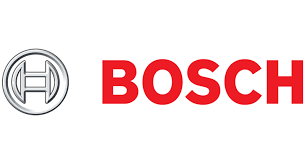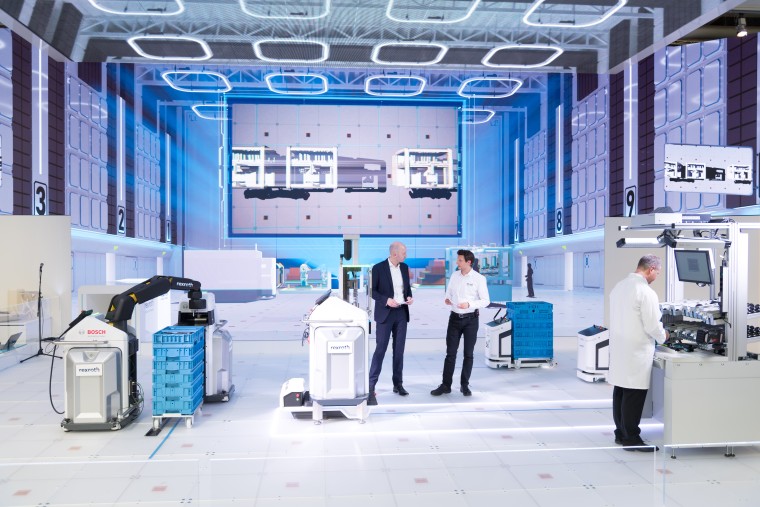14 July 2020
The key to the factory of the future – Manufacture #LikeABosch
- Improved competitiveness: Bosch sales grow to 750 million euros with Industry 4.0.
- Climate-neutral manufacturing: Bosch launches CO2 advisory service.
- Technology reimagined: Bosch brings open hardware and software to market.
- Comprehensive connectivity: Bosch develops cross-industry technologies.
- Building up expertise: Bosch offers training programs for Industry 4.0.
Stuttgart/Hannover, Germany – Manufacturing is the backbone of the German economy. It creates jobs, inspires innovation, and secures prosperity. Just under a quarter of Germany’s gross value added is attributable to manufacturing. To remain successful, however, the manufacturing industry needs to change to become greener, smarter, and more digital. As a leading IoT player, Bosch has all the core competencies required to shape connected manufacturing. The company equips factories and boosts competitiveness. At the Hannover Messe Digital Days (July 14–15, 2020), Bosch will be explaining its strategy and presenting ideas and solutions. Manufacturing “like a Bosch” means: achieving business success, environmental sustainability, technological flexibility, smart connectivity, and having the right skills and qualifications.
Business success: Industry 4.0 pays off
Bosch has been digitalizing manufacturing and logistics since 2012 – both in its own plants and in those of its customers. This can increase productivity by up to 25 percent. Bosch is aiming to achieve such a boost by applying artificial intelligence, for example to the planning and optimization of production processes. At the same time, the industrial internet of things makes companies more resilient, robust, and crisis-proof. It helps monitor the utilization and condition of individual machines and provides transparency about the supply chain. Industry 4.0 is becoming a key factor in business success. In 2019, Bosch generated sales of over 750 million euros with connected solutions for manufacturing and logistics. That was an increase of 25 percent from the previous year’s figure of some 600 million euros.
Environmental sustainability: the path to climate-neutral manufacturing
Bosch is taking the lead. Industry has a key role to play in the fight against climate change: it comes second only to the energy sector as the largest source of emissions. Against this backdrop, the manufacturing industry is developing technological solutions to reduce carbon dioxide emissions both in its own operations and in other sectors. Bosch wants to be climate-neutral by the end of 2020. More than 400 locations worldwide will then no longer leave a carbon footprint. Projects in Germany, France, India, and Mexico show the action that Bosch plants are taking to reduce their energy requirements and conserve resources. Based on its own climate neutrality experience, Bosch has set up a dedicated operating unit to provide assistance to companies as they work toward climate neutrality. Bosch Climate Solutions applies various levers and draws on products from Bosch’s Industry 4.0 portfolio. One example is the Bosch Energy Platform, a cloud-based software solution for managing the energy requirements and consumption of connected machines and systems. Smart hydraulic power units also play a key role. The CytroBox from Bosch Rexroth, for example, requires 80 percent less energy than conventional drives.
Technological flexibility: open and compatible products for the market
Stand-alone technological solutions have no place in the factory of the future. Products and processes must be agile and compatible. Bosch Rexroth is debuting a software-based, 5G-capable control technology that understands more than 30 data protocols. ctrlX Automation is set to become the control center of the factory of the future. With its Nexeed Industrial Application System, the Bosch Connected Industry business unit offers more than simply an app store for manufacturing and logistics. The various software applications can be ordered, used, and connected with one another as needed. All machine data is available in a clear and standardized format. Bosch’s extensive manufacturing expertise and outstanding flexibility were also key in helping the company respond quickly and appropriately to the coronavirus pandemic. Within a few weeks, Bosch’s special-purpose machinery unit designed dedicated systems for fully automated face mask production. Five production lines at four locations worldwide are now operational and working toward the target of producing over half a million masks per day.
Smart connectivity: driving forward new technologies in partnerships
Bosch believes 5G is the way forward. The new mobile communications standard meets the tough requirements of manufacturing. It will enable wireless “critical communication” for the first time. Bosch launched its research activities in the field of 5G early on and got involved with a host of national and international bodies in order to shape the new mobile communications standard to meet the needs of the manufacturing industry. The company is now starting to develop local 5G campus networks. At the same time, the first 5G-capable products are now entering the market. Besides the ctrlX Automation control platform, these include an autonomous transport system: the autonomous Active Shuttle navigates itself safely through manufacturing facilities and transports goods from the warehouse directly to the production lines where they are needed. Connected manufacturing doesn’t stop at the factory gate, let alone national borders. For this reason, Bosch participates in “cross-industry” projects and initiatives such as Platform Industry 4.0 or the GAIA-X European Data Infrastructure. The latter aims to create an open, digital ecosystem to help companies share data and scale business models worldwide, underpinned by jointly defined rules and uniform standards.
The right skills: qualified associates drive Industry 4.0
Industry 4.0 projects often fail at the implementation stage owing to a lack of qualified personnel. Bosch is working to counteract this by offering an extensive program of training and professional development. Associates can choose from around 200 training sessions, courses, and programs specific to Industry 4.0 and focused on aspects of manufacturing-related digitalization, such as programming or data analysis. Bosch both applies this expertise in its projects and uses it to help companies establish connected production and logistics. In addition, the Drive and Control Academy and Bosch Connected Industry offer over numerous training courses, which are open to customers and interested companies. Manufacture #LikeABosch presents the advantages that Industry 4.0 offers. This humorous and lighthearted IoT campaign provides insight into pioneering manufacturing operations. Testimonial Shawn, smart robots such as APAS, and Bosch associates – true Industry 4.0 experts – play the leading roles in the video clips shot at the Rexroth plant in Nuremberg at the beginning of March.





